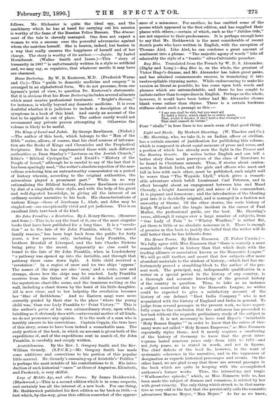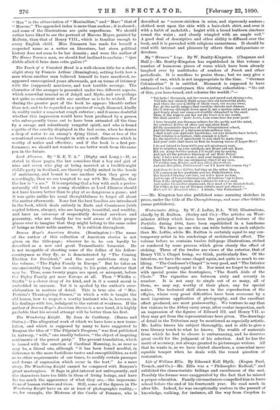The Hansa Towns. By Helen Zimmern. (T. Fisher Unwin.)— We
fully agree with Miss Zinunern that "there is scarcely a more remarkable chapter in history than that which deals with the trading alliance or association known as the Hanseatic League." We will go still further, and assert that few subjects offer more abundant materials to the student of history,—which fact has un- fortunately proved a stumbling-block to the author of the pre- sent work. The principal, nay, indispensable qualification in a writer on a special period in the history of any country, is a thorough and accurate knowledge of the general history of the country in question. Thus, to take as an instance a subject somewhat akin to the Hanseatic League, no writer could be expected to give a satisfactory account of the history of our defunct " East India Company " who is not acquainted with the history of England and India in general. To judge from several passages in the present work, we have regret- fully come to the conclusion that the authoress has proceeded to her task without the requisite preliminary study of the subject in general. It is not necessary to have read Bryce's "inimitable 'Holy Roman Empire ' " in order to know that the rulers of Ger- many were not called " Holy Roman Emperors," as Miss Zimmern repeatedly styles them ; and it merely requires a smattering of the history of Germany to know that the great inter- regnum lasted nineteen years only—from 1254 to 1273—and not forty years, as is stated in words, and not in figures. The chief defects of the book lie. however, in the want of systematic coherence in the narrative, and in the vagueness of designation as regards historical personages and events. On the other hand, we are glad to say that there are several passages in the book which are quite in keeping with the accomplished authoress's former works. Thus, the interesting and tragic " Wullenweber episode," which, as Miss Zimmern tells us, has been made the subject of dramas and romances, is related by her with great vivacity. The only thing which struck us in that narra- tive as very odd is the fact that she persistently calls the romantic adventurer Marcus Meyer, " Max Meyer." As far as we know, " Max " is the abbreviation of " Maximilian," and " Marc " that of " Marcus." The appended index is more than useless ; it is absurd ; and some of the illustrations are quite superfluous. We should rather have liked to see the portrait of Marcus Meyer, painted by Holbein, than that of Henry VIII., which is familiar enough to every English child. Miss Zimmern has made for herself a respected name as a writer on literature, but stern political history does not seem to be her domain ; and were the author of The Hansa Towns a man, we should feel inclined to exclaim : " Que liable allait-il faire dans cette galere ?"
The Touch of a Vanished Hand is a well-chosen title for a short, slight story by Francis Arthur (Remington), setting forth how a man whom another man believed himself to have murdered, re- appeared unrecognised years afterwards, got on terms of intimacy with the (supposed) murderer, and took terrible revenge. The eharacter of the avenger is presented under two different aspects, which somewhat remind us of Jekyll and Hyde, and are perhaps not quite as consistent with one another as is to be wished. For .during the greater part of the book he appears likeable rather than not, and to be regarded as a species of rough diamond, kindly in reality under a somewhat rough exterior ; and it seems doubtful whether this impression would have been produced by a person who subsequently turns out to have been animated all the time by a savage and relentlessly vengeful spirit, and who is found capable of the cruelty displayed in the last scene, when he denies a drop of water to an enemy's dying thirst. One or two of the sensational events are brought in with a swift directness which is -worthy of notice and effective; and if the book is a first per- formance, we should not wonder to see better work from the same pen in the future.







































 Previous page
Previous page